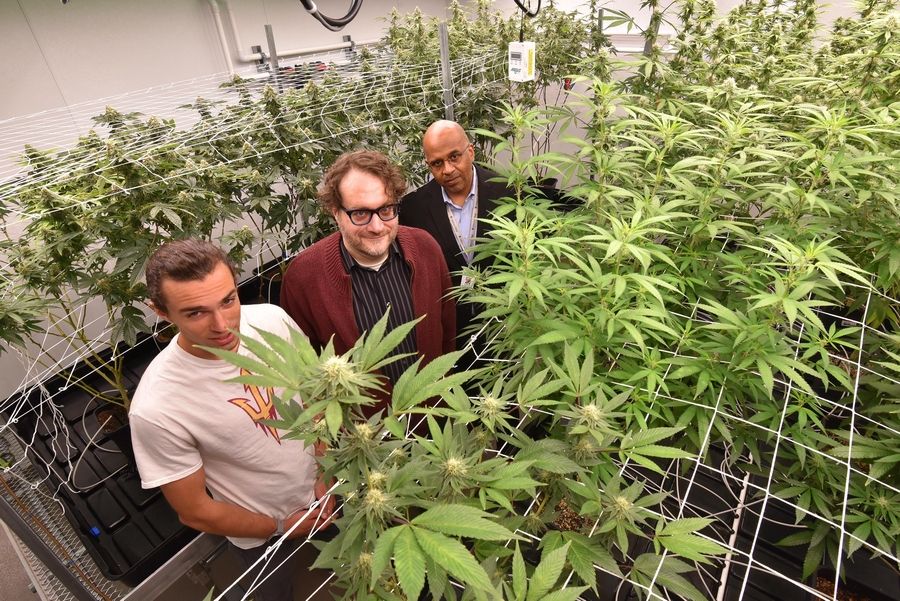As Illinois’ cannabis industry grows, area community colleges are adding programs to prepare students for careers in the field.
Oakton College in Des Plaines and Joliet Junior College both have jumped into cannabis studies, offering students certificate programs that equip them for jobs in dispensaries, cultivation centers and supply chain positions.
“It’s an exploding industry within the United States, so that creates a ripe opportunity for rapid movement and rapid expansion,” said Dain Meza-Gotto, director of workforce development at Joliet Junior College, which launched its cannabis studies program this spring.
With dispensaries generating millions in sales tax revenue for the state, Meza-Gotto said the cannabis studies program helps students looking for a new career and helps the industry grow through a trained workforce, which benefits the state even more.
“It really is a win for everyone,” he said.
Oakton College created its curriculum and introduced its for-credit certificate programs in 2019, making it the first college in Illinois with a cannabis studies program. In 2022, Oakton became the only college in Illinois with an indoor cultivation lab set up similar to what the industry uses at its grow centers.
In the four years since launching the first courses of the program, 237 students have completed certificate programs at Oakton. Since opening the indoor cultivation center, 35 students have completed the college’s cultivation program.
by signing up you agree to our terms of service
“We were immediately successful,” said Ileo Lott, Oakton provost and vice president for academic affairs, of the program. “We’ve not had a program launch that was that successful.”
The certificate programs at both colleges can be completed in as little as eight weeks, though Oakton’s cultivation certificate takes two semesters because of the hands-on work. Graduates of Oakton’s program also can transfer to Northern Michigan University to complete a bachelor’s degree in medicinal plant chemistry.
“We really want students to be as prepared as possible,” said Steve Fix, assistant professor and department chair for cannabis studies at Oakton.
“Students love the program,” he added, noting many previous graduates of the for-credit classes at Oakton have returned for the college’s courses in its new cultivation lab. “It’s wonderful to see their enthusiasm and gratifying to see them succeed.”
For students like Laura Banks, the program at Oakton is the first step toward achieving a dream. The Chicago woman has completed each of Oakton’s three certificate programs.
“I want to equip myself for when it’s time for me to open up my own dispensary,” the retired postal carrier said.
Both colleges have worked with industry experts to develop their courses. Joliet Junior College partnered with Green Flower to offer online cannabis certificate courses. PharmaCann, which has dispensaries and cultivation centers in eight states including Illinois, worked with Oakton to develop its cultivation lab.
Because federal law prohibits colleges from growing cannabis, Oakton uses hemp, which is similar to cannabis, in its cultivation lab.
Students get hands-on experience germinating plants, making sure the plants get the proper lighting and nutrients, propagating the plants and acquainting themselves with how an indoor cultivation center works.
In online courses for dispensary and transportation certificates, students explore various topics, including state laws regarding cannabis, customer service, proper product handling, medicinal uses and the products offered in dispensaries.
Providing advanced-level courses to prepare people to work in the cannabis industry helps sort out those who may have a passion for cannabis but may not enjoy the work required in a cultivation center or a dispensary.
“For us, (partnering with Oakton) was helping create this pipeline into good-paying jobs,” said Jeremy Unruh, vice president of public and regulatory affairs for PharmaCann Inc.
Representatives from both colleges noted salaries range from $35,000 to $45,000 a year for entry-level jobs in transportation and supply chain, and at dispensaries and cultivation centers.
The courses also provide another avenue to address social equity in communities that may have been hurt by drug enforcement in the past, when marijuana was illegal. Oakton, for example, works with companies to provide social equity scholarships to students who qualify.
“Social equity is of paramount importance,” Fix said. “We want to bring cannabis education to everyone.”



